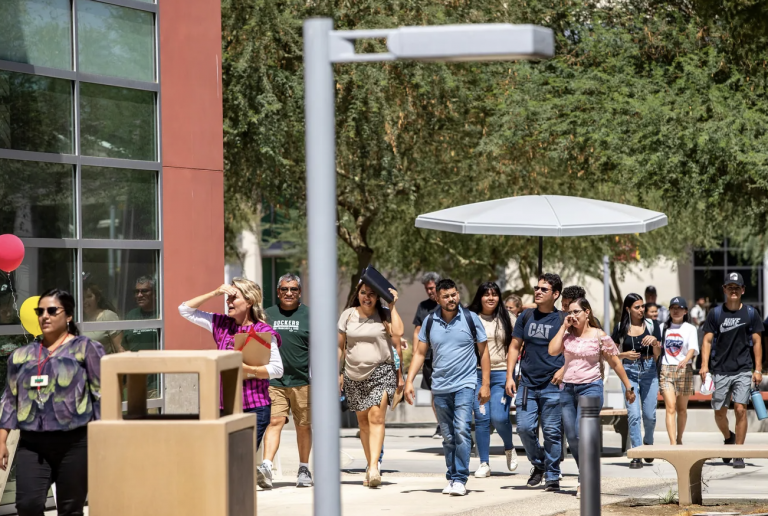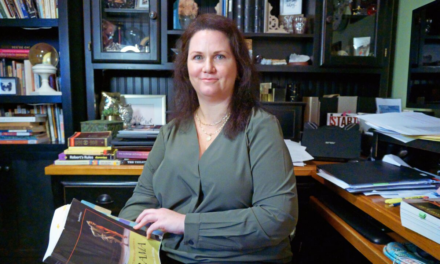Less than two months ago, College of the Desert leadership began the fall semester with a renewed sense of optimism as enrollment rebounded after two years of disruption caused by the COVID-19 pandemic.
But according to several employees who spoke at Friday’s Board of Trustees meeting or submitted written comments, morale is flagging.
“You are currently dysfunctional and you’re hurting our college,” adjunct accounting professor Julie Rescigno told the board. “You do not respect or trust each other and you let the community see it. You do not accept any responsibility for the bad press and instead, you lash out at voters.”
Three other faculty members plus COD Faculty Association President Oceana Collins spoke in person. Academic Senate President Kim Dozier read what she said were anonymous comments from 15 instructors who wanted to comment anonymously because they feared reprisals. (A full report of the comments can be found at bit.ly/COD-Faculty.)
Among their complaints: technology troubles, glitches in payroll services, and staffing shortages. Some said they were overworked and underpaid, and the adjunct faculty union said part-time faculty receive unequal pay for equal work compared to full-time faculty. Others expressed frustration with board members engaging in politics.
Rescigno and math professor Laura Graff expressed support for Superintendent/President Martha Garcia. They said she is being unfairly blamed for at least some residual problems from the previous administration, but Rescigno added the Board of Trustees is dysfunctional and Graff said it has been unsupportive of faculty.
“The current state of the college is the worst I have ever experienced,” wrote one faculty member who claimed to have worked at COD for over 20 years. “I feel, as a faculty member, I am not valued or respected for what I need to do my job correctly. The technology is beyond disappointing and leaves gaps in the ability to perform my job.”
Rescigno said she disagrees with anonymous comments in principle. “If someone has something to say, like myself, you come out and say it,” she said. “I have never experienced any kind of vindictive behavior from anybody in the administration because of my mouth and I have a big one.”
Later in the meeting, Garcia expressed gratitude to all COD employees. “I appreciate the concerns expressed,” she said. “The leadership team and I are working hard and are committed to do our best to continue to enhance our support to all of you.”
Trustee Bonnie Stefan said the board has not done enough to express appreciation for faculty.
“I feel bad that we maybe have neglected to say that to you over these last few months, maybe we felt under attack and things,” she said. “But I realize now post-pandemic, we’re asking you to do the impossible and we’re not giving you the adequate resources and that’s something that we need to work on.”
Technology
A cyberattack struck the college’s network in July, causing the school’s website to crash and enrollment services to go down for weeks. It followed a 2020 cyberattack under the administration of Garcia’s predecessor, Joel Kinnamon.
At least two faculty members said Friday there are ongoing issues with voicemail, and one said they cannot access a VPN — a secure internet connection for remote working. It is unclear if these issues are related to the recent cyberattack. “The technology is beyond disappointing and leaves gaps in the ability to perform my job,” wrote one employee who claimed to haveworked at COD for over 20 years.
Another faculty member said students were unable to access educational websites from the Palm Desert campus library last week, and WiFi has been spotty at the Indio campus. “This is humiliating to try and serve our students when our own services are not functioning, again and again and again,” that person wrote.
Another issue is a staff shortage dire enough to cause some fully enrolled classes to be canceled this fall. As of late September, COD had 45 open staff, teaching and administrative positions, according to a list provided by the college to The Desert Sun. The list included vacancies for seven leadership positions at the manager, director and vice president levels, plus 18 faculty members and 20 staff roles.
In addition, 13 employees are working “out of class” according to Friday’s board agenda. That generallymeans employees are tapped to cover duties outside their normal scope.
Meanwhile, at least four executives are serving with an interim tag.
The staff shortage has affected payroll, too.
A significant change in personnel caused payment for “overload assignments” due by Sept. 30 to be delayed six calendar days (four business days), according to a statement from college spokesperson Nicholas Robles to The Desert Sun. “Overload pay” is additional money outside of one’s salary for attending approved committee meetings, workshops and extra assignments beyond the typical faculty workload, Robles explained. He said 110 faculty and counselors were affected by the delay.
A school support staff union representative, Mark Rizzo, said Friday the only employee who knew how to process faculty payroll recently left the college, and he said the college has shown a lack of effort to permanently fill that critical position or train others.
One of the anonymous commenters wrote to the board that there have been “repeated, significant disruptions to faculty payroll and 403b contributions, with little or no explanation, inflicting emotional chaos and financial hardship.”
‘We are not a pawn in your political game’
Collins, the COD Faculty Association president, also had some scathing words for Promises Made-Promises Broken, a largely anonymous group that launched a media campaign late last year calling for the resignations of Garcia and the three trustees that voted to appoint her: Bea Gonzalez, Ruben Perez and Aurora Wilson.
The group’s complaints center largely on delays and downsizings to COD’s plans to build a campus in Palm Springs.
“How dare you criticize a system that you clearly don’t understand, and use the word ‘promise’ as a political jab for your personal gain,” she said to them in her board report. “The students and our employees have no stake in your moneymaking schemes. We are simply serving this community and providing opportunity in the face of all of this negativity. There are no broken promises here, and we are not a pawn in your political game.”
Collins did not elaborate on what she meant by “moneymaking schemes.” A Promises Made-Promises Broken spokesperson said he was not watching the board meeting Friday and would try to review the recording over the weekend.
After a college-commissioned study analyzing the need for a west valley campus was completed last month, COD has marched forward with downscaled plans for the Palm Springs site at the same price tag of $345 million that Kinnamon’s administration projected a much larger campus to cost. The new study warned that COD could struggle to recruit enough students to Palm Springs to sustain operating costs for even the downscaled campus.
Trustees Gonzalez and Perez have questioned whether that money, from a $577.8 million bond passed in 2016, could be more equitably distributed across the Coachella Valley.
The bond itself does not explicitly call for a Palm Springs campus, but it calls for investment in the Palm Desert campus, the Indio campus, a west valley campus, an east valley campus and community centers.
COD raised another bond for campus expansions and renovations in 2004 for $346.5 million. That money has been spent, largely on the Palm Desert and Indio campuses.
In recent weeks, the City of Coachella, the Coachella Valley Unified School district board and the Thermal-Oasis community council have responded to the trustees’ questions about equitable bond distribution by calling on COD to expand its services east of Indio, where the college has its largest satellite campus. COD also has a branch in Thermal.
Perez has blamed Kinnamon for failing to expand the Thermal campus, which is at capacity due to sewer issues, but Heather Benes, an English professor who has taught in Thermal since 2014, told the board Friday that blaming one person is “a false cause fallacy.”
“When a member of a board offers an inaccurate fact, and no one else on the board corrects it, the whole board’s credibility suffers,” Benes added.
At the board’s Oct. 7 meeting, the City of Desert Hot Springs revived a pitch for a campus in their city, and called on the college to imminently fix poor signage at its temporary location there. City officials simultaneously expressed support for a west valley campus in Palm Springs.
Collins said reports to the college from Desert Hot Springs, Coachella and the Thermal-Oasis Community Council on Oct.7 failed to consider operational challenges.
“Partnerships across the valley are crucial, and access for our students from one end of the valley to the other is very important to our faculty,” Collins said. “However, what was missing from those reports is that there continue to be issues for faculty with services at the satellite campuses. Classrooms are poorly equipped, and access to the classrooms and student services are limited. We believe that this is an equity issue for students attending these campuses. There has been a lot of talk about the Palm Springs campus, but perhaps it is time for the district to assess the viability of maintaining classes at some of these satellite campuses until they can be properly equipped and staffed.”
Politicking for elections
Perez and Wilson face reelection this November. Perez is running for the east valley seat against Larissa Chavez Chaidez, a former student trustee. Wilson is running for a mid-valley seat against Kinnamon, who retired in March 2021.
Combined, the four candidates have raised over $200,000 for their campaigns, likely making these the most expensive and highest-profile races in the college’s 64-year history.
There has been an unusual amount of politicking for a nonpartisan board election.
Chavez Chaidez accused Perez of illegally receiving pay from his state Assembly staff job while he was doing work for the college, based on a document provided to her by Kinnamon’s husband. That document, reviewed by The Desert Sun, neither proves nor disproves her accusation. Perez denies wrongdoing.
Perez then accused Kinnamon of “casting a dark cloud over the institution with lies and fear-mongering” at a faculty-sponsored candidates forum this month.
For his part, Kinnamon told faculty last summer that “politics, money and power” disrupted the search for his successor after Garcia was appointed over his longtime vice president, Annebelle Nery. Around that time, faculty considered a vote of no confidence against Garcia and the three trustees who voted to appoint her — Gonzalez, Perez and Wilson.
“You came in under very hostile circumstances, and you’ve led this institution with grace and vigor, and we’re getting stuff done,” Perez said to Garcia Friday.
He added that serving as board chair has not been easy but it “has been the honor of a lifetime.”
“As a public servant at heart, I can’t see myself doing anything else,” Perez said.
Evidently, however, strains between leadership and at least some faculty members have not healed since Garcia was hired.
“I have absolutely no issues with Dr. Garcia; she’s a lovely lady,” Graff, the math professor, said Friday. “However, since hiring Dr. Garcia the board has not done anything to help with morale. I’m going to say that the campus wanted somebody from within to be hired, and the board made a decision otherwise. That has nothing to do with Dr. Garcia. It has to do with the board making a decision against the faculty. We had somebody on board that would have kept things kept the ship going.”
Nery left COD in December to become the president of Santa Ana College. She is one of at least three vice presidents to leave COD since Garcia assumed office.
Meeting ends on note highlighting student success
Friday’s meeting ended on a high note as counselors presented data showing that in 2021, COD produced higher rates of students transferring to University of California schools or California State University schools relative to many other community colleges in the Inland Empire.
According to the report, 523 COD students transferred to a CSU and another 117 transferred to a UC in 2021. The college had nearly 11,000 students enrolled last year, but the report did not say how many were eligible to transfer.
The number of transfers from COD to a UC has more than doubled since 2016, and it is slightly greater than it was prior to the pandemic in 2019.
The board also heard a report from two engineering students who, through COD, got to work with NASA over the summer to help develop space technology, and a report from an architecture professor about students building a “tiny house” from scratch.
Lastly, the meeting concluded with a tribute to the late Peggy Cravens, a longtime desert resident and college philanthropist.
Jonathan Horwitz covers education for The Desert Sun. Reach him at jonathan.horwitz@desertsun.com or @Writes_Jonathan.





